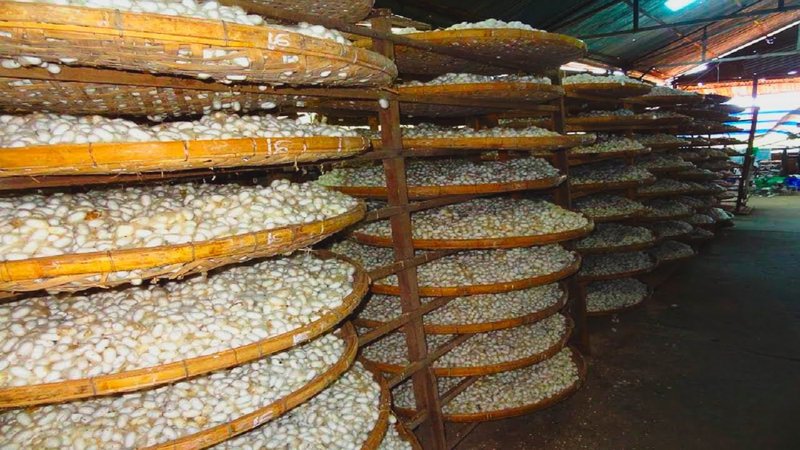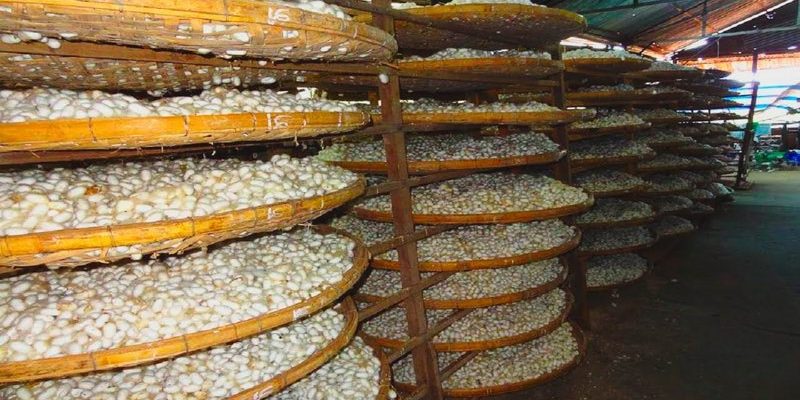
Silkworms, those little creatures responsible for producing luxurious silk, also generate waste that some believe can enrich the soil. This waste, known as sericulture waste, is often overlooked, but it carries certain nutrients that could benefit your plants. You might be wondering: can you really feed your garden with the leftovers from silkworm farming? Let’s dive into what makes this organic material tick and see if it deserves a spot in your gardening toolbox.
What is Silkworm Waste?
Silkworm waste is essentially the excrement produced by silkworms during their lifecycle, primarily when they are raised for silk production. It’s amazing to think that these tiny creatures can produce such a significant byproduct! Silkworms munch on mulberry leaves, digest them, and finally pass out waste that contains various nutrients.
Now, before you raise an eyebrow at the idea of using this waste in your garden, consider this: nature has a way of recycling. Just like how animal manure can help enrich soil, silkworm waste can, too. It’s rich in nitrogen, phosphorus, and potassium, which are vital for plant growth. These are the nutrients that help your plants thrive, making silkworm waste a potentially valuable addition to your gardening practices.
Benefits of Using Silkworm Waste as Fertilizer
Let’s get into the nitty-gritty of why silkworm waste might be a good choice for your garden. Here are some benefits that you might find compelling:
- Nutrient-Rich: Silkworm waste is known for its high nutrient content. It’s loaded with nitrogen, which helps in leaf growth, phosphorus for root development, and potassium for overall plant health.
- Organic Matter: When you add silkworm waste to your soil, you’re boosting its organic matter. This makes the soil structure better and helps retain moisture, which is crucial for plant health.
- pH Balancer: Another interesting aspect is that silkworm waste tends to have a neutral pH level. This can help balance the acidity in your soil, creating a more hospitable environment for various plants.
With all these benefits, it’s easy to see why some gardeners are keen to give silkworm waste a try. But hold on a second! Is it all good news, or are there downsides we should consider?
Potential Downsides of Silkworm Waste
Before you start collecting silkworm waste (or buying it), it’s essential to weigh the potential downsides. Here are a few things to think about:
- Quality Control: Not all silkworm waste is created equal. The quality can vary based on the diet of the silkworms. If they were fed low-quality mulberry leaves, the waste may not be as beneficial for your garden.
- Processing Needed: Unlike some other organic fertilizers, silkworm waste may need processing. This could involve drying or composting to ensure it’s safe and effective for plants.
- Odor Issues: Let’s be honest: silkworm waste might have an unpleasant smell. While composting can help, it’s something to consider if you’re sensitive to odors in your garden.
These potential downsides shouldn’t necessarily deter you from using silkworm waste, but they are factors worth considering. If you decide to give it a shot, make sure you’re getting high-quality waste and prepare to manage any odor that might arise.
How to Use Silkworm Waste in Your Garden
So, you’re curious about using silkworm waste but aren’t sure where to start? Here’s a simple guide on how to incorporate it into your gardening routine:
1. Collect the Waste:
– If you’re working directly with silkworm farms, collecting fresh waste might be easy. If buying, ensure it’s labeled as organic and nutrient-rich.
2. Compost it:
– Before using the waste directly, consider composting it first. Mixing it with other organic materials can help eliminate odor and enhance its nutrient profile.
3. Apply Sparingly:
– When you’re ready to use the waste, apply it sparingly to your garden beds. About a thin layer or mixed into the top couple of inches of soil will work well.
4. Watering:
– After applying, give your garden a good watering. This helps nutrients seep into the soil and makes them available for your plants.
By following these steps, you can maximize the benefits of silkworm waste while minimizing the potential downsides.
Comparing Silkworm Waste to Other Organic Fertilizers
You might be wondering how silkworm waste stacks up against other popular organic fertilizers like compost or manure. Here’s a quick comparison to give you a clearer picture:
| Fertilizer Type | Nutrient Profile | Odor | Application Frequency |
| Silkworm Waste | High in nitrogen, phosphorus, potassium | Moderate | 1-2 times a year |
| Compost | Varies, but generally balanced | Low (if well-aged) | Regularly, as needed |
| Animal Manure | Varies by animal (often high in nitrogen) | High (if fresh) | 1-3 times a year |
Each option has its pros and cons based on your garden’s needs. Silkworm waste offers a unique blend of nutrients that could be just what your plants are looking for!
The Verdict: Myth or Fact?
So, is silkworm waste a myth or fact when it comes to organic fertilizer? Honestly, I’d say it’s a bit of both.
On one hand, it offers solid advantages like nutrient richness and organic matter benefits. On the other hand, it has downsides that may make some gardeners think twice. If you’re comfortable managing those aspects, it can definitely be a valuable addition to your gardening toolkit.
Before diving in, think about your garden’s specific needs and do a little more research or consult with local gardening experts who may have experience with silkworm waste.
Final Thoughts on Silkworm Waste
Using silkworm waste as organic fertilizer opens up an interesting opportunity for gardeners looking to enrich their soil with unique resources. While it may not be the first thing that comes to mind when you think of fertilizers, it certainly deserves a closer look.
Weighing the benefits against the downsides can help you make a more informed decision. And remember, every garden is different, so what works for one might not work for another. Here’s to happy gardening and exploring new avenues to cultivate your green thumb!

